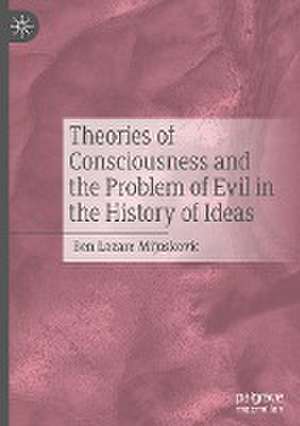Theories of Consciousness and the Problem of Evil in the History of Ideas
Autor Ben Lazare Mijuskovicen Limba Engleză Hardback – 9 apr 2023
| Toate formatele și edițiile | Preț | Express |
|---|---|---|
| Paperback (1) | 679.74 lei 38-45 zile | |
| Springer Nature Switzerland – 10 apr 2024 | 679.74 lei 38-45 zile | |
| Hardback (1) | 714.75 lei 6-8 săpt. | |
| Springer Nature Switzerland – 9 apr 2023 | 714.75 lei 6-8 săpt. |
Preț: 714.75 lei
Preț vechi: 871.65 lei
-18% Nou
Puncte Express: 1072
Preț estimativ în valută:
136.83€ • 142.23$ • 113.45£
136.83€ • 142.23$ • 113.45£
Carte tipărită la comandă
Livrare economică 07-21 februarie 25
Preluare comenzi: 021 569.72.76
Specificații
ISBN-13: 9783031264047
ISBN-10: 3031264045
Pagini: 218
Ilustrații: XI, 218 p. 7 illus.
Dimensiuni: 148 x 210 mm
Greutate: 0.43 kg
Ediția:2023
Editura: Springer Nature Switzerland
Colecția Palgrave Macmillan
Locul publicării:Cham, Switzerland
ISBN-10: 3031264045
Pagini: 218
Ilustrații: XI, 218 p. 7 illus.
Dimensiuni: 148 x 210 mm
Greutate: 0.43 kg
Ediția:2023
Editura: Springer Nature Switzerland
Colecția Palgrave Macmillan
Locul publicării:Cham, Switzerland
Cuprins
Chapter 1. The Battle between the Gods and the Giants: The Idealists and the Materialists.- Chapter 2. Historical and Conceptual Background: The Achilles of Rationalist Arguments.- Chapter 3. Can Senseless Matter Alone Think?.- Chapter 4. Is Perception or Self-Consciousness Primary? To which First Principle Does Personal Identity Belong?.- Chapter 5. The Role Freedom, Spontaneity, and Genius Assume within Ethical, Epistemic, and Aesthetic Contexts versus the Boundaries of Scientific Determinism.- Chapter 6. Time-Consciousness, Subjective Idealism, and Personal Identity.- Chapter 7. The Philosophical Application of the Concepts of Freedom, Spontaneity, and Genius in Various Contexts.- Chapter 8. On the Distinction between the Is and the Ought, Facts and Values, Science and Ethics.- Chapter 9. Narcissism, Loneliness and the Problem of Evil.- Chapter 10. Déjà Vu and the Problem of Evil: A Case Study of Political Narcissism.- Chapter 11. Is the Existential Condition of Mankind Improving or Deteriorating?.- Chapter 12. Is the Physical Universe and the Evolutionary Ages of Mankind Cyclical or Linear?.
Notă biografică
Ben Lazare Mijuskovic was associate professor at California State University, Dominguez Hills, USA, prior to retirement. He is also a licensed clinical therapist and has worked for many years with the San Diego and Los Angeles Departments of Mental Health.
Textul de pe ultima copertă
In this book, Ben Lazare Mijuskovic uses both an interdisciplinary and History of Ideas approach to discuss four forms of intertwined theories of human consciousness and reflexive self-consciousness (Plato, Augustine, Descartes, Leibniz, Kant, and Hegel; Schopenhauer’s subconscious irrational Will; Brentano and Husserl’s transcendent intentionality; and Freud’s dynamic ego). Mijuskovic explores these theories within the context of psychological issues, where the discussion is undergirded by the conflict between loneliness and intimacy. He also explores them in the context of ethics, where the dynamic is between the values of good and evil. The book historically traces these issues in both a personal as well as a political framework.
Ben Lazare Mijuskovic was associate professor at California State University, Dominguez Hills, USA, prior to retirement. He is also a licensed clinical therapist and has worked for many years with the San Diego and Los Angeles Departments of Mental Health.
Ben Lazare Mijuskovic was associate professor at California State University, Dominguez Hills, USA, prior to retirement. He is also a licensed clinical therapist and has worked for many years with the San Diego and Los Angeles Departments of Mental Health.
Caracteristici
Covers philosophical, psychological, sociological, literary, and political themes Utilizess a "History of Ideas" approach Explores four forms of intertwined theories of human consciousness and reflexive self-consciousness
